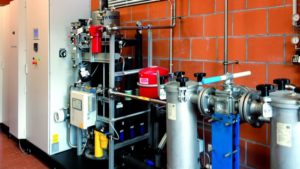Organic micropollutants in wastewater, also known as trace substances, have increasingly come under scrutiny from the authorities responsible for water pollution control. In Germany, the federal state of North Rhine-Westphalia – an extremely densely populated, highly industrialized region – is taking a pioneering role in water protection. It is using Xylem’s Wedeco technology to remove micropollutants.
Germans love to swim in their rivers, and in some places they can now do so without having to worry about pollution. In accordance with Germany’s Federal Water Act, municipal and industrial sewage treatment plants reprocess more than 96 percent of wastewater to the highest standard possible using current technology.
However, as methods of treating wastewater to remove well-known pollutants have improved, common treatment plants are not able to treat micropollutants. These include hormone pollution from contraceptive pills, antibiotics used in farming, X-ray contrast media, and chemicals that have an endocrine disrupting effect even in the smallest quantities.
Technology that removes micropollutants during treatment
Until now, around 90 percent of surface water in North Rhine-Westphalia has not achieved a really good environmental status – partly due to micropollutants. The “Water” master plan from the Ministry for Environment, Agriculture, Conservation and Consumer Protection shows how pollution from these substances, which are extremely harmful to the environment, can be reduced.

Several operators of wastewater treatment plants are now using Xylem’s advanced technology to remove organic micropollutants, including its Wedeco solution that uses ozone. Ozone reacts with micropollutants, converting them into non-toxic components. “In the best-case scenario, the oxidation results in substances that can be degraded to biomass in the biological stage of treatment,” says Arne Wieland, Process Engineer at Xylem Services.
Combining ozone and filtration for best results
The ideal solution is a combination of ozonation and filtration. A large-scale trial carried out in partnership with a Swedish Environmental Research Institute has shown that this can markedly reduce not only the concentration of micropollutants, but also parameters for microorganisms, total suspended solids and coloration.
North Rhine-Westphalia’s strategy is to choose a process for treating micropollutants that takes into consideration local circumstances (pollutant loads, existing technology, space available, etc.). “To find out which process works best in each individual case, a feasibility study is carried out,” Wieland says. “It includes a realistic cost/benefit analysis and shows in detail a comparison and how the various combinations of processes can be integrated into the wastewater treatment.”
An initial large-scale program called “Reine Ruhr” (Clean River Ruhr) completed an assessment of the micropollutants, making a distinction between acute risks and potential chronic risks. This resulted in a precautionary value that is used as a long-term minimum quality target, based on the ALARA (As Low As Reasonably Achievable) principle. Experts in various administrative districts then worked out the measures required. Attention was given first to particularly badly polluted water and their neighboring wastewater treatment plants.
Wedeco technology used to clean Ruhr river
A second project called “Sichere Ruhr” (Safe Ruhr) is also underway to make the Ruhr river cleaner and safer in terms of microbial water quality. Water companies and institutions are working together, firstly to reduce the load of pathogens and secondly to develop a forecasting system that gives early warning when limit values for safe swimming conditions are about to be exceeded.
In this project, Xylem is responsible for delivering technologies, such as the Wedeco UV disinfection and ozone oxidation solution, to reduce pollution from pathogens and chemical micropollutants.
Xylem helping to reduce micropollutants throughout Germany
Wastewater treatment plants in North Rhine have now started to successfully reduce micropollutants. For example, Xylem’s Wedeco systems can now be found in Bad Sassendorf, Warburg, Espelkamp and Aachen-Soers. In addition, the AdOx project in Cologne has been successfully using a combination of activated charcoal and ozone oxidation since 2017.
“We’re able to provide full support – from planning to commissioning,” Wieland says. “And this applies to projects worldwide – not just in North Rhine-Westphalia. We’re experts when it comes to clean and safe water, and we help our customers in each step of the project.”

